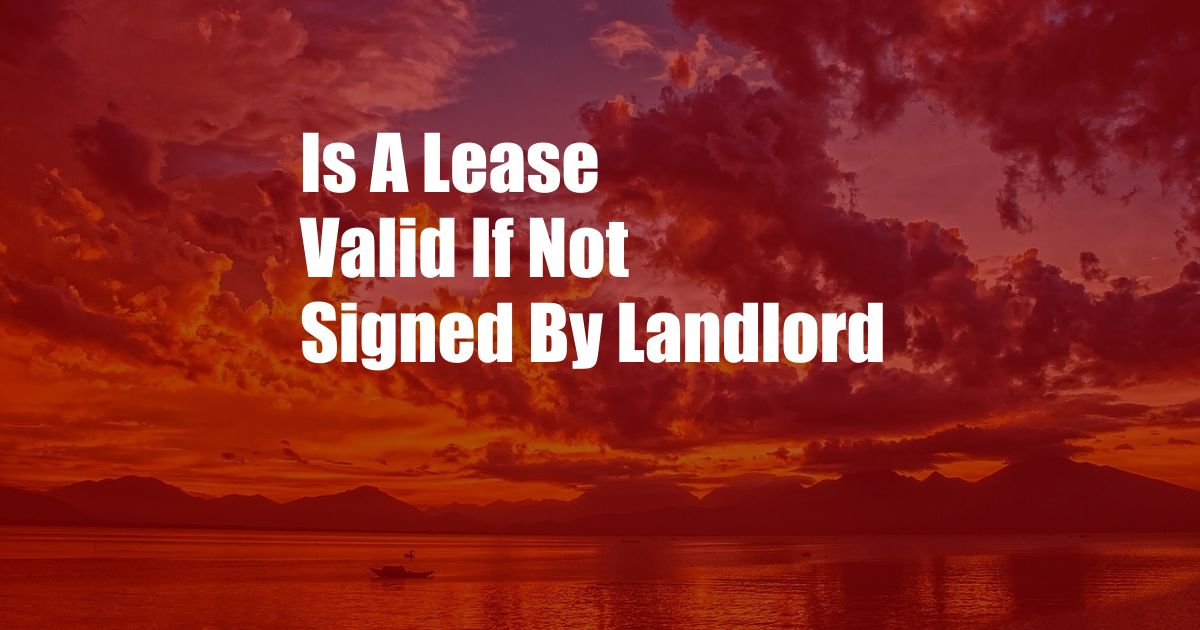
Is a Lease Valid if Not Signed by Landlord?
Imagine yourself excited about moving into a new apartment, having just found the perfect place. You sign the lease and hand it to the landlord, eagerly awaiting the keys. But then, a cold realization hits you – the landlord never signed the lease! Panic sets in as you wonder, “Is this lease even valid?” Fret not, as we delve into the intricacies of lease validity and explore your options in such a scenario.
The Importance of a Landlord’s Signature
A lease is a legally binding contract that outlines the terms and conditions of tenancy between a landlord and a tenant. It is a crucial document that protects both parties’ rights and responsibilities. A landlord’s signature on a lease signifies their acceptance of the terms and their willingness to enter into the agreement. Without it, the lease may be considered incomplete and unenforceable.
Understanding Lease Validity
In most jurisdictions, a lease is not legally valid unless it is signed by both the landlord and the tenant. This signature serves as an acknowledgment of the parties’ agreement to the terms outlined in the lease. Without the landlord’s signature, the lease may be deemed void or unenforceable. However, there are certain exceptions to this rule, which we will explore later.
Exceptions to the Signature Requirement
There are some situations where a lease may be considered valid even if it is not signed by the landlord. These exceptions include:
- Estoppel: If the landlord has already accepted rent or allowed the tenant to occupy the property, they may be estopped from denying the validity of the lease, even if they have not signed it.
- Oral Agreements: In some states, oral lease agreements may be legally enforceable, even if they are not in writing. However, it is generally advisable to have a written lease to avoid disputes.
What to Do if Your Lease is Not Signed by the Landlord
If you find yourself in a situation where your lease is not signed by the landlord, it’s important to act promptly. Here are some steps you should consider:
- Contact the Landlord: Reach out to the landlord immediately and inquire why they have not signed the lease. There may be a simple explanation, such as an oversight or a miscommunication.
- Negotiate a Solution: If the landlord is unwilling to sign the lease as it is, try to negotiate a mutually acceptable solution. This could involve modifying the lease terms or seeking legal advice.
- Document Your Attempts: Keep a record of your communication with the landlord, including dates and times. This will provide evidence of your efforts to resolve the issue.
Seeking Legal Advice
If all else fails, you may consider seeking legal advice from an attorney specializing in landlord-tenant law. They can review your lease and provide guidance on your legal options. An attorney can also represent you in court if necessary.
Expert Tips for Lease Validity
Here are some expert tips to help ensure the validity of your lease:
- Always Get Everything in Writing: Never enter into a lease agreement that is not in writing. This is especially important if the landlord is not present to sign it in person.
- Review the Lease Carefully: Before signing a lease, take the time to read and understand every provision. Make sure you are comfortable with the terms before you sign.
- Keep a Copy of the Lease: Once the lease is signed, keep a copy for your records. This will come in handy if there are any disputes in the future.
Frequently Asked Questions
Q: What happens if a landlord refuses to sign a lease?
A: If a landlord refuses to sign a lease without a valid reason, you may have legal recourse. You can try to negotiate a solution or seek legal advice.
Q: Can a landlord change the terms of a lease after it has been signed?
A: Generally, a landlord cannot change the terms of a lease without the tenant’s consent. However, there may be exceptions in certain circumstances, such as if the changes are necessary to comply with the law.
Q: What should I do if I discover that my lease is invalid?
A: If you discover that your lease is invalid, you should contact the landlord immediately. You may be able to negotiate a new lease or seek legal advice.
Conclusion
A lease is a legally binding document that protects the rights and responsibilities of both landlords and tenants. It is essential that a lease is signed by both parties to ensure its validity. If you find yourself in a situation where your lease is not signed by the landlord, it is important to act promptly and seek legal advice if necessary. By following the tips and information provided in this article, you can ensure that your lease is valid and protect your interests as a tenant.
So, are you interested in knowing more about lease validity and its implications? Let us know in the comments below!